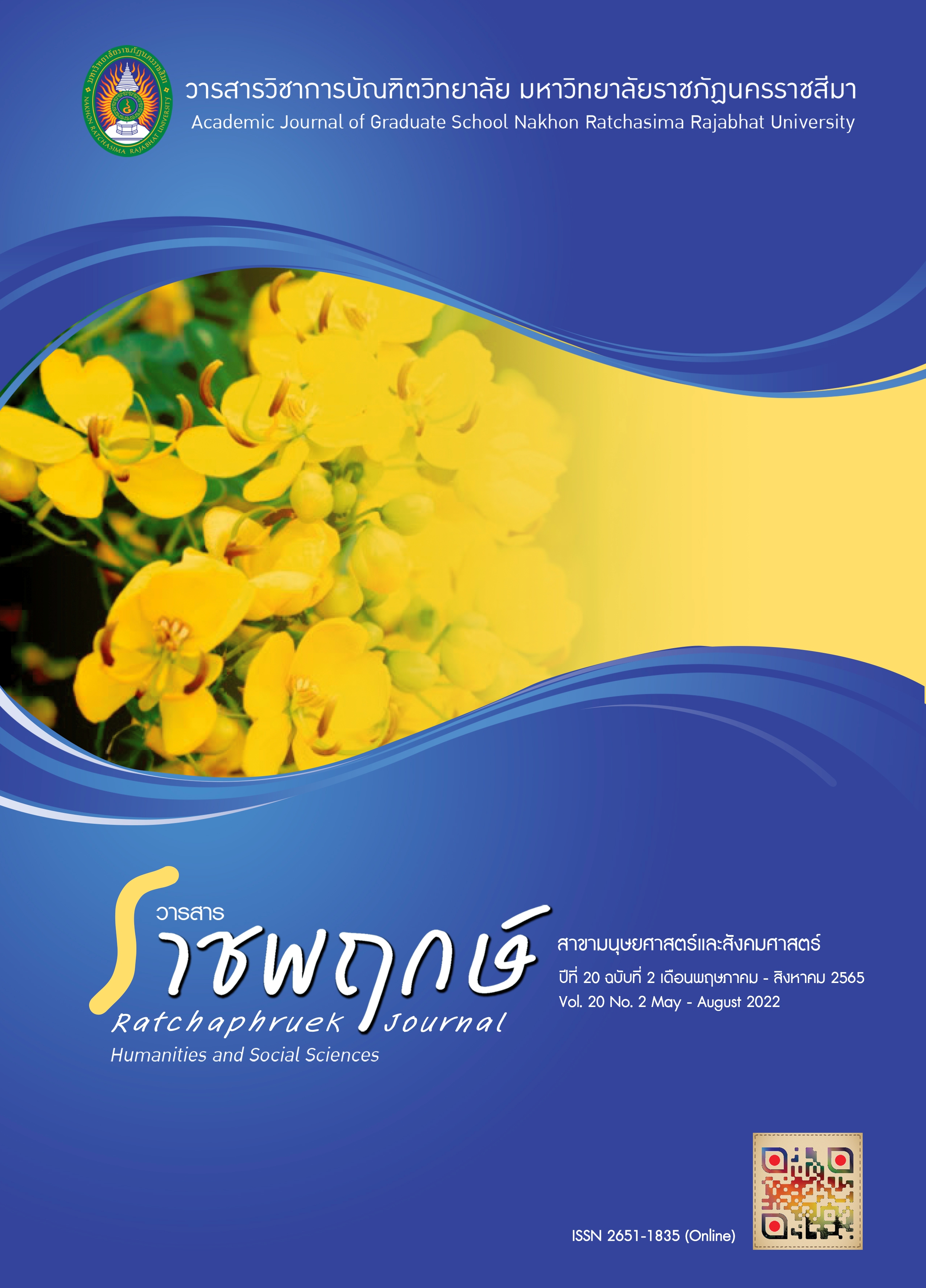A Study of Thailand 4.0 Undergraduate Student’s Essentials
Main Article Content
Abstract
This research was divided into 2 phases. Phase 1 aimed to study 1) the expectations of essential skills among Thai graduates. The samples consisted of 8 entrepreneurs and university instructors. In-depth interviewing was used for collecting data. Content analysis was applied for analyzing, and 2) the needs of essential skills among Thai graduates in Thailand 4.0 era. Focus group was used for collecting data from 15 undergraduate students, and questionnaire was used to collect data from 540 undergraduate students. Content analysis and Priority Needs Index were applied. Phase 2 aimed to develop a causal model of psychosocial and behavioral factors affecting the essential skills among graduates. The samples consisted of 645 undergraduate students. The questionnaires were collected and analyzed with Structural Equation Model.
The research showed that 1) the essential skills of graduates based on the expectations of instructors and entrepreneurs were critical thinking and problem-solving skills, creativity and innovation skills, lifelong learning skills, cooperation and teamwork skills, communications, information and media literacy skills; 2) the needs for the essential soft skills of graduates categorized by characteristics of skills that should be developed were creativity and innovation skills, lifelong learning skills, leadership and social influence skills, while hard skills were found in English proficiency, research, and professional skills; 3) the proposed causal relationship model fitted with the empirical data (2 = 9.62, df = 5, p-value= 0.09, RMSEA = 0.04, SRMR 0.01, CFI = 1.00, NFI = 1.00, GFI = 1.00)
Article Details

This work is licensed under a Creative Commons Attribution-NonCommercial-NoDerivatives 4.0 International License.
References
กัลยา สร้อยสิงห์. (2563). ปัจจัยที่ส่งผลต่อทักษะการเรียนรู้และนวัตกรรมในศตวรรษที่ 21 ของนักศึกษาวิทยาลัยดุสิตธานี. วารสารวิทยาลัยดุสิตธานี, 14(2), น. 486-500.
กาญจนา จันทร์พราหมณ์. (2563). ความต้องการในการใช้ภาษาอังกฤษของพนักงานระดับปฏิบัติการในนิคมอุตสาหกรรมจังหวัดชลบุรี. วารสารสังคมศาสตร์และมานุษยวิทยาเชิงพุทธ, 5(8), น. 425-436.
จารุวรรณ เขียวน้ำชุม และสุรีพร อนุศาสนนันท์. (2560). รูปแบบแนวคิดทางทฤษฎี และงานวิจัยเกี่ยวกับ ปัจจัยเชิงสาเหตุของการเรียนรู้แบบนำตนเอง. วารสาร HR Intelligence, 12(1), น. 125-140.
จิรกานต์ สิริกวินกอบกุล. (2562). บัณฑิตแห่งอนาคต ผลิตผลที่มีคุณภาพของมหาวิทยาลัยไทย. เอกสารประกอบโครงการสัมนาวิชาการอุดมศึกษาเรื่อง The Smarter Future of Higher Education. กรุงเทพฯ: คณะครุศาสตร์ จุฬาลงกรณ์มหาวิทยาลัย.
บุษกร วัฒนบุตร. (2564). ปัจจัยที่มีอิทธิพลต่อการพัฒนา Soft Skills ของเยาวชนไทยในศตวรรษ ที่ 21. วารสารวิจัยวิชาการ, 4(1), น. 87-94.
ปรัชญาพร ทองประสิทธิ์, สักรินทร์ อยู่ผ่อง และอัคครัตน์ พูลกระจ่าง (2563). รูปแบบการพัฒนาทักษะด้านอารมณ์โดยวิธีการเรียนรู้ด้วยตนเองสำหรับผู้ปฏิบัติงานส่วนหน้าในธุรกิจบริการ. วารสารมนุษยศาสตร์และสังคมศาสตร์ มหาวิทยาลัยธนบุรี, 14(2), น. 97-108.
พิศสมัย อรทัย และศรีเวียงแก้ว เต็งเกียรติ์ตระกูล. (2554). การประเมินความต้องการจำเป็นด้านการจัดการศึกษาของหลักสูตรพยาบาลศาสตร์บัณฑิตตามการรับรู้ของบัณฑิตพยาบาลรามาธิบดี. รามาธิบดีพยาบาลสาร, 17(3), น. 463–476.
มนตรี อินตา. (2562). SOFT SKILLS: ทักษะที่จำเป็นสู่ความเป็นมืออาชีพของครูยุคใหม่. วารสารวิชาการศึกษาศาสตร์, 20(1), น. 153-167.
มนัสวี ธนะปัด, วิไลลักษณ์ ลังกา และอรอุมา เจริญสุข. (2557). ปัจจัยที่มีอิทธิพลต่อความคิดสร้างสรรค์ ของนักเรียนชั้นมัธยมศึกษาปีที่ 3: การวิเคราะห์เส้นทางแบบกลุ่มพหุ. วิทยาการวิจัยและวิทยาการปัญญา, 12(1), น. 88-98.
รังสรรค์ โฉมสาย. (2561). การศึกษาพฤติกรรมการเรียนรู้ด้วยตัวเองของนิสิตมหาวิทยาลัยมหาสารคาม. วารสารศึกษาศาสตร์ มหาวิทยาลัยมหาสารคาม, 12(3), น. 309-317.
สินธวา คามดิษฐ์. (2559). “ประเทศไทย 4.0 การศึกษาไทย 4.0” การศึกษา 4.0 เป็นยิ่งกว่าการศึกษา. กรุงเทพฯ: จุฬาลงกรณ์มหาวิทยาลัย.
สุรเกียรติ ธาดาวัฒนาวิทย์. (2561). คุณลักษณะบัณฑิตที่สอดคล้องกับการพัฒนาประเทศไทย ตามแนว “ประเทศไทย 4.0” วารสารวิทยาลัยดุสิตธานี, 12(2), น. 404-416.
สุวิมล ว่องวาณิช. (2558). การวิจัยประเมินความต้องการจำเป็น (พิมพ์ครั้งที่ 3). กรุงเทพฯ: จุฬาลงกรณ์มหาวิทยาลัย.
อรณิชชา ทศตา และกชพร ใจอดทน. (2563). ปัจจัยที่ส่งผลต่อความคิดสร้างสรรค์ของนักศึกษาระดับปริญญาตรีวิทยาลัย นครราชสีมา. วารสารวิชาการสมาคมสถาบันอุดมศึกษาเอกชนแห่งประเทศไทย, 26(2), น. 64-78.
Bandura, A. (1986). Social Foundation of thought and action. A Social Cognitive Theory. New Jersey: Prentice-Hall.
Cobo, C. (2013). Mechanisms to identity and study the demand for innovation skill in world-renowned organizations. On the Horizon, 21(2), pp. 96-106.
Creswell, J. W. (2007). Qualitative Inquiry Research Design. (2th ed.). California: Sage.
Hair, J. F., Black, W. C., Babin, B. J. & Anderson, R. E. (2010). Multivariate data analysis. (7th ed.). New Jersey: Prentice-Hall.
Jin, X., Jiang, Q., Xiong, W., Pan, X. & Zhao, W. (2022). Using the Online Self-Directed Learning Environment to Promote Creativity Performance for University Students. Educational Technology & Society, 25(2), pp. 130-147.
Pender, N. J., Mardaugh, C. L. & Parsons, M. A. (2006). Health promotion in nursing practice. (5th ed.). New Jersey: Upper Saddle River.
Salleh, U. K. M., Zulnaidi, H., Rahim, S. S. A., Zakaria, A. R., & Hidayat, R. (2019). Roles of Self-Directed Learning and Social Networking Sites in Lifelong Learning. International Journal of Instruction, 12(4), pp. 167-182.
Schwab, K. (2019). The Global Competitiveness Report 2019. Geneva Switzerland: World Economic Forum.
Schwab, K. (2020). The Future of Jobs Report 2020. Geneva Switzerland: World Economic Forum.


